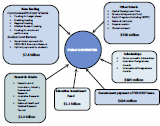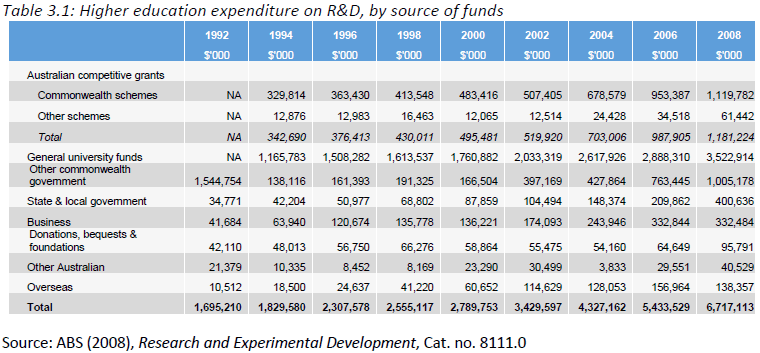|
|
|
|
|
|
|
News & Views item - December 2010 |
![]() What
Percent of University R&D Funding is Awarded Competitively Through Peer Review?
(December 20, 2010)
What
Percent of University R&D Funding is Awarded Competitively Through Peer Review?
(December 20, 2010)
 The
Background Paper for the Higher Education Base Funding Review
released last week by the Commonwealth Government although not primarily
concerned with funding for research and development, does devote a short section
(3.4) to it.
The
Background Paper for the Higher Education Base Funding Review
released last week by the Commonwealth Government although not primarily
concerned with funding for research and development, does devote a short section
(3.4) to it.
In its discussion of universities' research and development funding the background paper notes:
Research activities in universities are funded in part through government
programs established specifically to fund the direct and, in some cases,
indirect costs of research and research training.
In addition to the specific research funding programs, universities report
supporting some of the costs of research activities from general university
funds, including base funding.
In 2008, ‘General University Funds’ provided $3.5 billion of R&D expenditure
(see Table 3.1). These general university funds are derived from domestic
student fees, overseas student fees and base funding.
Although the ABS data are likely to over-estimate the total resources devoted to
research (this was found to be a tendency in the UK transparent costing
exercises), it provides an indication that some CGS [Commonwealth Grant Scheme]
funding is being used for research.

________________________________________________
Referring to the last documented figures (2008) of the total of $6.72 billion of higher education expenditure on R&D, Australian competitive grants amounted to $1.18 billion or 17.6%.
While that doesn't preclude peer review being involved in awarding a part of the $5.54 billion not part of "Australian competitive grants" it's probably reasonable to assume that some 75% - 80% of HERD funding was not peer reviewed.
The retrospective assessment of the ERA now encumbering Australian academia in no way addresses the marked imbalance of non-peer review funding vs peer reviewed R&D, if anything, it is a retrograde step. Had the Minister for Innovation, Industry, Science and Research, Kim Carr, and his cabinet colleagues properly addressed the shortcomings in current peer review systems and set into motion methods to work out how to "play" the man/group rather than the institution, that might well have produced a farsighted higher education revolution in R&D -- say to start with ⅓ peer reviewed moving to ˝.
But of course that wouldn't have tightened direct governmental and institution administrational control of R&D funding.